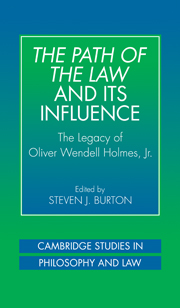Book contents
- Frontmatter
- Contents
- Acknowledgments
- List of Contributors
- The Path of the Law and Its Influence
- Introduction
- 1 Law as a Vocation: Holmes and the Lawyer's Path
- 2 The Bad Man and the Good Lawyer
- 3 Why Practice Needs Ethical Theory: Particularism, Principle, and Bad Behavior
- 4 Theories, Anti-Theories, and Norms: Comment on Nussbaum
- 5 Traversing Holmes's Path toward a Jurisprudence of Logical Form
- 6 Holmes on the Logic of the Law
- 7 Holmes versus Hart: The Bad Man in Legal Theory
- 8 The Bad Man and the Internal Point of View
- 9 Oliver Wendell Holmes, Jr., and William James: The Bad Man and the Moral Life
- 10 Emerson and Holmes: Serene Skeptics
- 11 The Path Dependence of the Law
- 12 Changing the Path of the Law
- 13 Holmes, Economics, and Classical Realism
- 14 Comment on Brian Leiter's “Holmes, Economics, and Classical Realism”
- Appendix: The Path of the Law
- Index
6 - Holmes on the Logic of the Law
Published online by Cambridge University Press: 22 October 2009
- Frontmatter
- Contents
- Acknowledgments
- List of Contributors
- The Path of the Law and Its Influence
- Introduction
- 1 Law as a Vocation: Holmes and the Lawyer's Path
- 2 The Bad Man and the Good Lawyer
- 3 Why Practice Needs Ethical Theory: Particularism, Principle, and Bad Behavior
- 4 Theories, Anti-Theories, and Norms: Comment on Nussbaum
- 5 Traversing Holmes's Path toward a Jurisprudence of Logical Form
- 6 Holmes on the Logic of the Law
- 7 Holmes versus Hart: The Bad Man in Legal Theory
- 8 The Bad Man and the Internal Point of View
- 9 Oliver Wendell Holmes, Jr., and William James: The Bad Man and the Moral Life
- 10 Emerson and Holmes: Serene Skeptics
- 11 The Path Dependence of the Law
- 12 Changing the Path of the Law
- 13 Holmes, Economics, and Classical Realism
- 14 Comment on Brian Leiter's “Holmes, Economics, and Classical Realism”
- Appendix: The Path of the Law
- Index
Summary
Again and again throughout his long career, Oliver Wendell Holmes, Jr., seemed to be waging a jurisprudential campaign against something he called “logic.” His first great one-liner (and it remains his most famous) was “The life of the law has not been logic; it has been experience.” In a much-quoted letter, he described Christopher Columbus Langdell, Dean of the Harvard Law School, as representative of “the powers of darkness” in legal thought, because he “is all for logic and hates any reference to anything outside it.” The Path of the Law includes six paragraphs denouncing the “fallacy of logical form” in legal thought. In his dissent in Lochner v. New York, Holmes wrote that “[g]eneral propositions do not decide concrete cases,” because judicial decision rests on a “judgment or intuition more subtle than any articulate major premise.” And in a later dissent also attacking Constitutional judicial activism, he deprecated “pressing the broad words of the Fourteenth Amendment to a drily logical extreme.”
These passages are well known and have been influential, but it is natural for readers with a background in analytical philosophy to find confusion in them. Scott Brewer's essay (Chapter 5 in this volume) does just that, arguing that Holmes was not clear on the target of his “anti-logic” campaign, for he seems to have meant various things by “logic”: systematic coherence, deduction, induction, analogy, and even just plain common sense.
- Type
- Chapter
- Information
- The Path of the Law and its InfluenceThe Legacy of Oliver Wendell Holmes, Jr, pp. 133 - 157Publisher: Cambridge University PressPrint publication year: 2000
- 1
- Cited by



